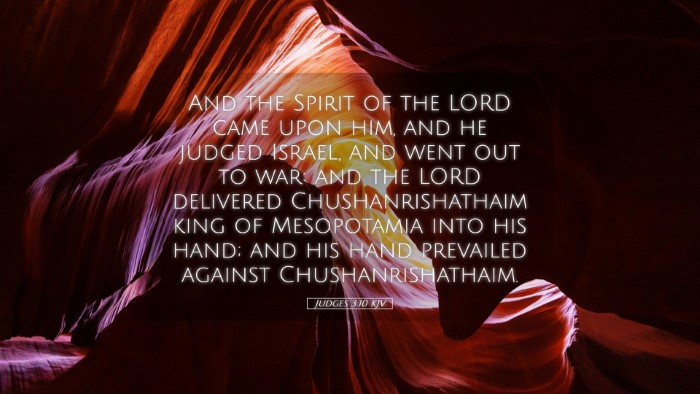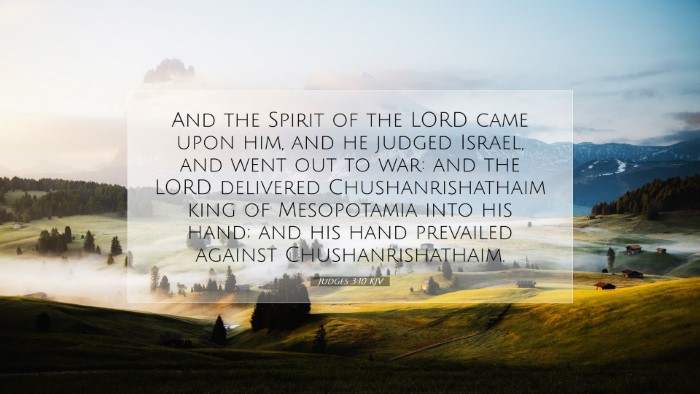Commentary on Judges 3:10
Judges 3:10 presents a pivotal moment in the narrative of Israel's history as seen through the lens of divine interaction and the cyclical pattern of rebellion, oppression, supplication, and deliverance that characterizes the Book of Judges. The verse states:
"The Spirit of the Lord came upon him, and he judged Israel, and went out to war: and the Lord delivered Cushanrishathaim king of Mesopotamia into his hand; and his hand prevailed against Cushanrishathaim."
Overview
In this commentary, we will explore several vital aspects of this verse, drawing insights from esteemed public domain commentators including Matthew Henry, Albert Barnes, and Adam Clarke. This passage not only highlights the work of God's Spirit in empowering leaders but also serves as a reflection of Israel's continual need for divine intervention.
1. The Role of the Spirit of the Lord
According to Matthewe Henry's Commentary, the phrase "the Spirit of the Lord came upon him" signifies a profound empowerment provided by God. This empowerment is essential for faithful leadership and is a recurring theme throughout Scripture.
-
Empowerment for Leadership: From Henry's perspective, leaders in Israel were not merely political figures; they were divinely appointed judges endowed with the Holy Spirit to guide and protect the people of Israel.
-
Divine Enablement: Albert Barnes notes that the Spirit's coming upon Othniel (the judge referred to in this passage) symbolizes God's direct involvement in equipping His chosen instrument for the task ahead.
2. The Nature of the Judgment
The verse continues to depict Othniel's role as a judge who goes out to war. This can be interpreted as a demonstration of the divine mandate wherein judges would be instrumental in bringing peace and justice against oppressors.
-
War as a Divine Calling: Adam Clarke emphasizes that Othniel’s military actions were a response to God's directive. The judges were often called to confront both physical and spiritual battles on behalf of the nation.
-
God’s Battles: Barnes elucidates that the war led by Othniel is not primarily about earthly conquest but reflects the ongoing spiritual warfare that Israel faced, again highlighting the necessity of divine intervention.
3. Deliverance and Victory
The latter part of the verse mentions the defeat of Cushanrishathaim, the king of Mesopotamia. The victory illustrates God’s faithfulness to His people and His ability to deliver them from formidable foes.
-
God’s Deliverance: Henry comments on the significant triumph experienced by Israel, attributing their victory not to Othniel’s might, but entirely to the intervention of God. This reinforces the notion that spiritual deliverance is solely within God’s purview.
-
God’s Sovereignty: Clarke’s analysis points out that the name Cushanrishathaim itself, meaning "double wickedness," indicates the nature of the oppressor. The deliverance from such a foe showcases God's sovereignty over the situation, affirming His power over even the most severe adversities.
4. Theological Implications
Judges 3:10 encapsulates several theological implications that are particularly relevant for scholars and theologians today.
-
Continuity of the Spirit’s Work: The mention of the Spirit’s intervention reveals a theology of the Holy Spirit that is not limited to the New Testament but is foundational in the Old Testament narrative as well.
-
God as Deliverer: This passage reaffirms the characterization of God as a deliverer, illustrating the consistent theme of God's redemptive action throughout the Scriptures. He actively engages in saving His people from despair.
-
Reflection on Human Leadership: The reliance on divinely chosen leaders points to the need for godly leadership in the church today. It calls for a reconsideration of how leaders are appointed and the dependency of their effectiveness on divine empowerment.
-
Spiritual Warfare: The mention of war serves as a metaphor for the spiritual battles believers face in their lives. This suggests the necessity of being equipped and empowered by the Holy Spirit to confront and overcome challenges.
5. Application for Pastors and Theologians
The insights drawn from Judges 3:10 offer valuable lessons for pastors and theologians striving to lead and guide effectively in contemporary settings. The passage signifies that:
-
Leadership is Divinely Ordained: Church leaders are to seek God’s guidance and empowerment in their role, recognizing that true leadership is a stewardship empowered by the Holy Spirit.
-
God’s Sovereignty in Challenges: Encouragement from this text is that God is sovereign over every oppressor and is faithful to deliver those who trust in Him. Pastors can utilize this assurance in their ministry to inspire faithfulness amidst trials.
-
Encouragement to Seek Divine Empowerment: The necessity of prayer and reliance on the Holy Spirit can be emphasized in congregational teaching, promoting a culture that values divine enablement over mere human effort.
-
Understanding the Nature of Worship and Warfare: Emphasizing the duality of worship and spiritual warfare encourages congregations to engage in both fervent worship and spiritual vigilance, fostering a holistic approach to faith.
Conclusion
Judges 3:10 is not merely a historical account; it is rich in meaning and application for today's faith communities. The intersections of divine empowerment, the role of leaders, God’s deliverance, and the continuous call to spiritual warfare prompt a reflective inquiry into how we live as believers. As we draw from the insights of Henry, Barnes, and Clarke, may we be encouraged to seek the Spirit’s guidance and power in facing the complexities of our spiritual journey.


